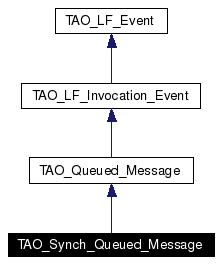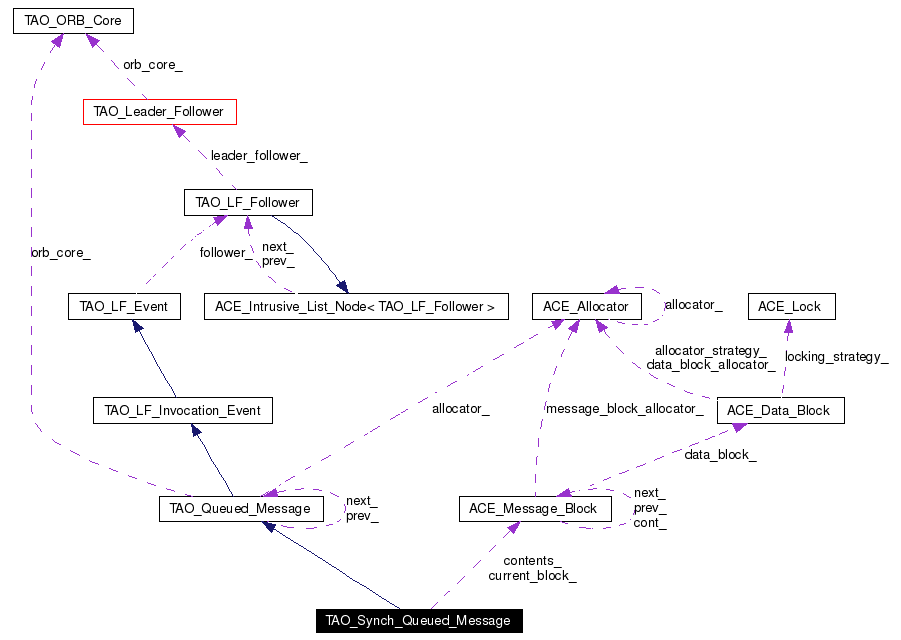
#include <Synch_Queued_Message.h>
Inheritance diagram for TAO_Synch_Queued_Message:


Public Member Functions | |
| TAO_Synch_Queued_Message (const ACE_Message_Block *contents, TAO_ORB_Core *oc, ACE_Allocator *alloc=0, bool is_heap_allocated=false) | |
| Constructor. | |
| virtual | ~TAO_Synch_Queued_Message (void) |
| Destructor. | |
| const ACE_Message_Block * | current_block (void) const |
Implement the Template Methods from TAO_Queued_Message | |
| virtual size_t | message_length (void) const |
| Return the length of the message. | |
| virtual int | all_data_sent (void) const |
| Return 1 if all the data has been sent. | |
| virtual void | fill_iov (int iovcnt_max, int &iovcnt, iovec iov[]) const |
| Fill up an io vector using the connects of the message. | |
| virtual void | bytes_transferred (size_t &byte_count) |
| Update the internal state, data has been sent. | |
| virtual TAO_Queued_Message * | clone (ACE_Allocator *alloc) |
| Clone this element. | |
| virtual void | destroy (void) |
| Reclaim resources. | |
Private Attributes | |
| ACE_Message_Block * | contents_ |
| The contents of the message. | |
| ACE_Message_Block * | current_block_ |
| The current message block. | |
Reliable requests block the sending thread until the message is sent, likewise, the sending thread must be informed if the connection is closed or the message times out.
In contrast oneway (and AMI) requests sent with the SYNC_NONE policy are simple discarded if the connection fails or they timeout.
Another important difference is the management of the data buffer: one SYNC_NONE messages the buffer is immediately copied into a newly allocated buffer, and must be deallocated. Other types of requests use the memory allocated by the sending thread.
Definition at line 47 of file Synch_Queued_Message.h.
|
||||||||||||||||||||
|
Constructor.
Definition at line 16 of file Synch_Queued_Message.cpp. Referenced by clone().
00021 : TAO_Queued_Message (oc, alloc, is_heap_allocated) 00022 , contents_ (const_cast<ACE_Message_Block*> (contents)) 00023 , current_block_ (contents_) 00024 { 00025 } |
|
|
Destructor.
Definition at line 27 of file Synch_Queued_Message.cpp.
00028 {
00029
00030 }
|
|
|
Return 1 if all the data has been sent.
Implements TAO_Queued_Message. Definition at line 50 of file Synch_Queued_Message.cpp. References current_block_. Referenced by TAO_Transport::send_synch_message_helper_i().
00051 {
00052 return this->current_block_ == 0;
00053 }
|
|
|
Update the internal state, data has been sent. After the TAO_Transport class completes a successful (or partially successful) I/O operation it must update the state of all the messages queued. This callback method is used by each message to update its state and determine if all the data has been sent already.
Implements TAO_Queued_Message. Definition at line 82 of file Synch_Queued_Message.cpp. References ACE_Message_Block::cont(), current_block_, ACE_Message_Block::length(), ACE_Message_Block::rd_ptr(), TAO_LF_Event::state_changed(), and TAO_LF_Invocation_Event::state_changed_i().
00083 {
00084 this->state_changed_i (TAO_LF_Event::LFS_ACTIVE);
00085
00086 while (this->current_block_ != 0 && byte_count > 0)
00087 {
00088 size_t const l = this->current_block_->length ();
00089
00090 if (byte_count < l)
00091 {
00092 this->current_block_->rd_ptr (byte_count);
00093 byte_count = 0;
00094 return;
00095 }
00096
00097 byte_count -= l;
00098 this->current_block_->rd_ptr (l);
00099 this->current_block_ = this->current_block_->cont ();
00100
00101 while (this->current_block_ != 0
00102 && this->current_block_->length () == 0)
00103 {
00104 this->current_block_ = this->current_block_->cont ();
00105 }
00106 }
00107
00108 if (this->current_block_ == 0)
00109 this->state_changed (TAO_LF_Event::LFS_SUCCESS,
00110 this->orb_core_->leader_follower ());
00111 }
|
|
|
Clone this element.
Implements TAO_Queued_Message. Definition at line 114 of file Synch_Queued_Message.cpp. References ACE_DEBUG, ACE_NEW_MALLOC_RETURN, ACE_NEW_RETURN, ACE_Message_Block::clone(), current_block_, TAO_Queued_Message::is_heap_created_, LM_DEBUG, ACE_Allocator::malloc(), TAO_debug_level, and TAO_Synch_Queued_Message(). Referenced by TAO_Transport::send_reply_message_i().
00115 {
00116 TAO_Synch_Queued_Message *qm = 0;
00117
00118 // Clone the message block.
00119 // NOTE: We wantedly do the cloning from <current_block_> instead of
00120 // starting from <contents_> since we dont want to clone blocks that
00121 // have already been sent on the wire. Waste of memory and
00122 // associated copying.
00123 ACE_Message_Block *mb = this->current_block_->clone ();
00124
00125 if (alloc)
00126 {
00127 ACE_NEW_MALLOC_RETURN (qm,
00128 static_cast<TAO_Synch_Queued_Message *> (
00129 alloc->malloc (sizeof (TAO_Synch_Queued_Message))),
00130 TAO_Synch_Queued_Message (mb,
00131 this->orb_core_,
00132 alloc),
00133 0);
00134 }
00135 else
00136 {
00137 // No allocator, so use the common heap!
00138 if (TAO_debug_level == 4)
00139 {
00140 // This debug is for testing purposes!
00141 ACE_DEBUG ((LM_DEBUG,
00142 "TAO (%P|%t) - Synch_Queued_Message::clone\n"
00143 "Using global pool for allocation \n"));
00144 }
00145
00146 ACE_NEW_RETURN (qm,
00147 TAO_Synch_Queued_Message (mb, this->orb_core_),
00148 0);
00149 }
00150
00151 // Set the flag to indicate that <qm> is created on the heap.
00152 if (qm)
00153 {
00154 qm->is_heap_created_ = true;
00155 }
00156
00157 return qm;
00158 }
|
|
|
Definition at line 33 of file Synch_Queued_Message.cpp. References current_block_. Referenced by TAO_Transport::send_synchronous_message_i().
00034 {
00035 return this->current_block_;
00036 }
|
|
|
Reclaim resources. Reliable messages are allocated from the stack, thus they do not be deallocated. Asynchronous (SYNC_NONE) messages are allocated from the heap (or a pool), they need to be reclaimed explicitly. Implements TAO_Queued_Message. Definition at line 161 of file Synch_Queued_Message.cpp. References ACE_DES_FREE, current_block_, and ACE_Message_Block::release().
00162 {
00163 if (this->is_heap_created_)
00164 {
00165 ACE_Message_Block::release (this->contents_);
00166 this->current_block_ = 0;
00167
00168 // If we have an allocator release the memory to the allocator
00169 // pool.
00170 if (this->allocator_)
00171 {
00172 ACE_DES_FREE (this,
00173 this->allocator_->free,
00174 TAO_Synch_Queued_Message);
00175
00176 }
00177 else // global release..
00178 {
00179 delete this;
00180 }
00181 }
00182 }
|
|
||||||||||||||||
|
Fill up an io vector using the connects of the message. Different versions of this class represent the message using either a single buffer, or a message block. This method allows a derived class to fill up the contents of an io vector, the TAO_Transport class uses this method to group as many messages as possible in an iovector before sending them to the OS I/O subsystem.
Implements TAO_Queued_Message. Definition at line 56 of file Synch_Queued_Message.cpp. References ACE_ASSERT, ACE_Message_Block::cont(), current_block_, iovec::iov_base, iovec::iov_len, ACE_Message_Block::length(), and ACE_Message_Block::rd_ptr().
00059 {
00060 ACE_ASSERT (iovcnt_max > iovcnt);
00061
00062 for (const ACE_Message_Block *message_block = this->current_block_;
00063 message_block != 0 && iovcnt < iovcnt_max;
00064 message_block = message_block->cont ())
00065 {
00066 size_t const message_block_length = message_block->length ();
00067
00068 // Check if this block has any data to be sent.
00069 if (message_block_length > 0)
00070 {
00071 // Collect the data in the iovec.
00072 iov[iovcnt].iov_base = message_block->rd_ptr ();
00073 iov[iovcnt].iov_len = static_cast<u_long> (message_block_length);
00074
00075 // Increment iovec counter.
00076 ++iovcnt;
00077 }
00078 }
00079 }
|
|
|
Return the length of the message. If the message has been partially sent it returns the number of bytes that are still not sent. Implements TAO_Queued_Message. Definition at line 39 of file Synch_Queued_Message.cpp. References current_block_, and ACE_Message_Block::total_length(). Referenced by TAO_Transport::send_message_block_chain_i().
00040 {
00041 if (this->current_block_ == 0)
00042 {
00043 return 0;
00044 }
00045
00046 return this->current_block_->total_length ();
00047 }
|
|
|
The contents of the message. The message is normally generated by a TAO_OutputCDR stream. The application marshals the payload, possibly generating a chain of message block connected via the 'cont()' field. Definition at line 85 of file Synch_Queued_Message.h. |
|
|
The current message block. The message may be set in multiple writev() operations. This point keeps track of the next message to send out. Definition at line 92 of file Synch_Queued_Message.h. Referenced by all_data_sent(), bytes_transferred(), clone(), current_block(), destroy(), fill_iov(), and message_length(). |
 1.3.6
1.3.6